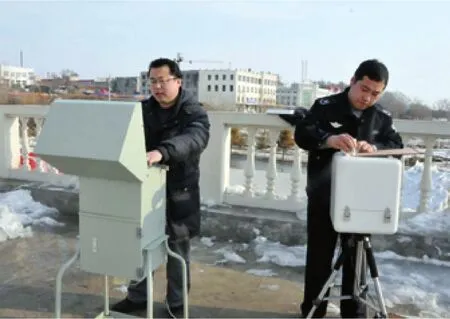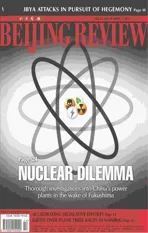Keeping an Eye on Radioactivity
2011-10-14ByYUANYUAN
By YUAN YUAN
Keeping an Eye on Radioactivity
By YUAN YUAN
China sets up a national testing system for levels of radiation from various sources

24-HOUR TESTING: Engineers with a monitoring station in Heilongjiang Province check radiation level in air on March 30
Radioactive iodine had been detected in the air above several regions of China, said China’s National Nuclear Emergency Coordination Committee on March 29.
The regions include Heilongjiang Province in the northeast, Beijing and southeastern coastal areas.
The detected levels of radiation were reportedly below a one-hundredthousandth of the average annual exposure level.
The committee said the radioactive iodine was of extremely low levels, posed no threat to the public and no protective measures needed to be taken.
The results came from monitoring and analysis by the Beijing-based Regional Specialized Meteorological Center affiliated to the World Meteorological Organization and the International Atomic Energy Agency, the State Oceanic Administration and the Ministry of Environmental Protection.
The radioactive substances are believed to have traveled to China by air from the leaked Fukushima Daiichi Nuclear Power Plant in Japan, which was badly damaged by a 9.0-magnitude earthquake and sequent tsunami on March 11.
“We will keep track of this and report new conditions concerning radioactive substances in China,” said Wang Yiren, Chief of the National Nuclear Emergency Management Offce.
On March 23, two Japanese travelers were detected to have alarmingly high levels of radiation when they arrived in Wuxi City in Jiangsu Province.
The radiation was discovered when quarantine officers conducted checks on passengers aboard flight ZH9056 from Tokyo to Wuxi. The General Administration of Quality Supervision, Inspection and Quarantine of China said one of the Japanese came from Nagano Prefecture, about 350 km from Fukushima, where the radiation-leaking nuclear power plant is located, and the other from Saitama Prefecture, about 200 km from Fukushima.
The travelers were observed in the No.2 Affiliated Hospital of Soochow University in Suzhou overnight and their luggage and clothes were detoxified. Liu Yulong, a doctor with the hospital, said the Japanese people were discharged from the hospital on March 24.
On March 18, China began radiation tests for people arriving in China from Japan. Sixty-six hospitals in 31 provinces, autonomous regions and municipalities in China have been designated for radiation testing. By March 24, of 151 tested people, three were found to have abnormal radiation levels, including the two travelers from Japan.
Abnormal levels of radiation were also found on March 21 on a Japanese merchant vessel berthed at Xiamen Port, Fujian Province. The vessel belongs to Mitsui O.S.K. Lines, a Japanese company operating global bulk freight services.
O n M a r c h 2 3, t h e G e n e r a l Administration of Quality Supervision, Inspection and Quarantine banned imports into China of a variety of Japanese food products, including dairy, seafood and vegetables as well as fruit from Japanese prefectures of Fukushima, Tochigi, Gunma, Ibaraki and Chiba.
The Ministry of Health ordered on March 27 health authorities in 14 areas including Beijing, Tianjin, Shanghai and coastal provinces to test drinking water and food for radiation.
This measure followed the confirmation of the level of radiation stemming from radioactive isotope iodine-131 was higher than usual in four counties in Heilongjiang.
“Based on the current situation and tests so far, people do not need to worry about contamination of air, food or water,” said Wang Zhongwen, a researcher with the Radiation Safety Department of the China Institute of Atomic Energy.
The radiation testing ordered by the ministry, Wang said, was part of the routine inspection of food and water undertaken in many parts of the country.
“The radiation level has not changed since March 27 and is less harmful than having a medical X-ray,” said Zhao Haixing, Deputy Director of the Hulin County Environmental Protection Bureau in Heilongjiang, on March 28.
“Life is as peaceful as ever,” said Song Yufeng, a local official in Hulin on March 28. “Our county gets most of its information from TV, which has made it clear to everyone there is too little radiation to pose a health hazard.”
Officials in nearby counties said there had not been any incidents of panicked customers buying up iodine tablets or other substances often used as protection against radiation.
